牛津译林版(2019)必修 第三册Unit 4 Scientists who changed the world Grammar and Usage 课件(共50张PPT)
文档属性
| 名称 | 牛津译林版(2019)必修 第三册Unit 4 Scientists who changed the world Grammar and Usage 课件(共50张PPT) |  | |
| 格式 | pptx | ||
| 文件大小 | 2.7MB | ||
| 资源类型 | 教案 | ||
| 版本资源 | 牛津译林版(2019) | ||
| 科目 | 英语 | ||
| 更新时间 | 2023-06-15 11:51:47 | ||
图片预览


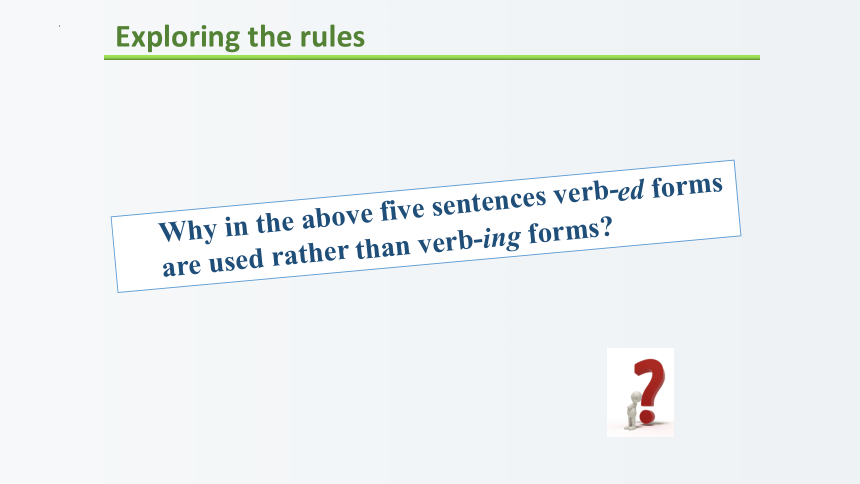
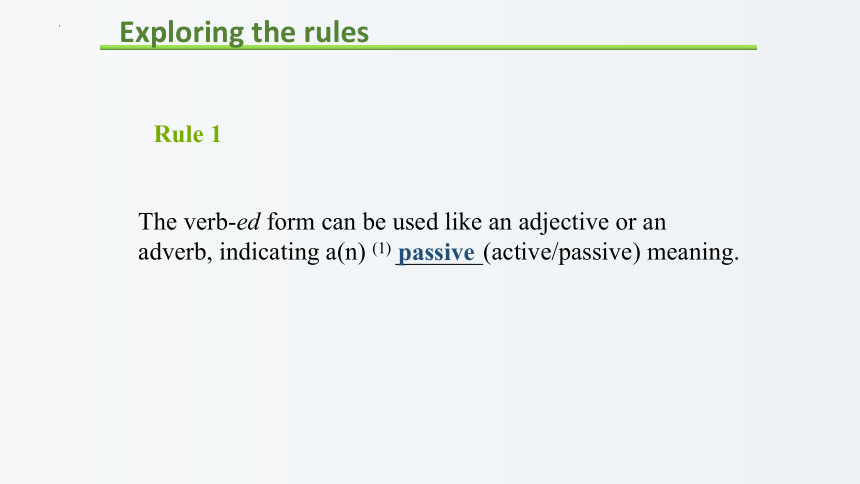
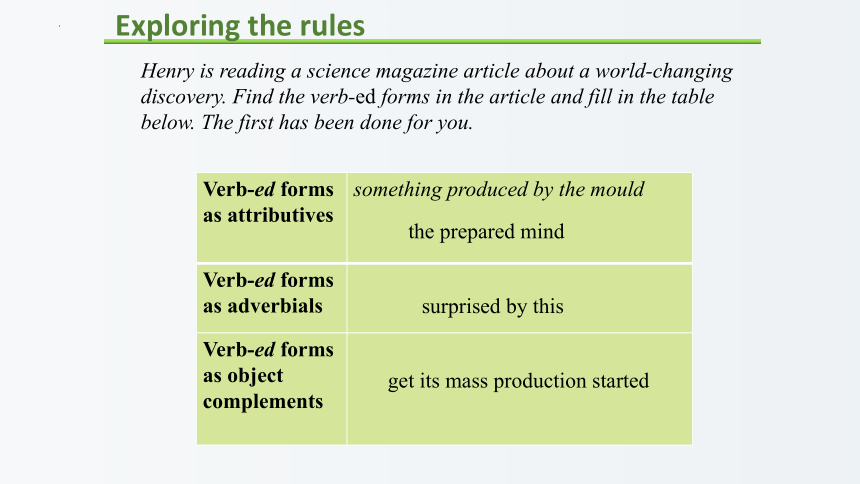
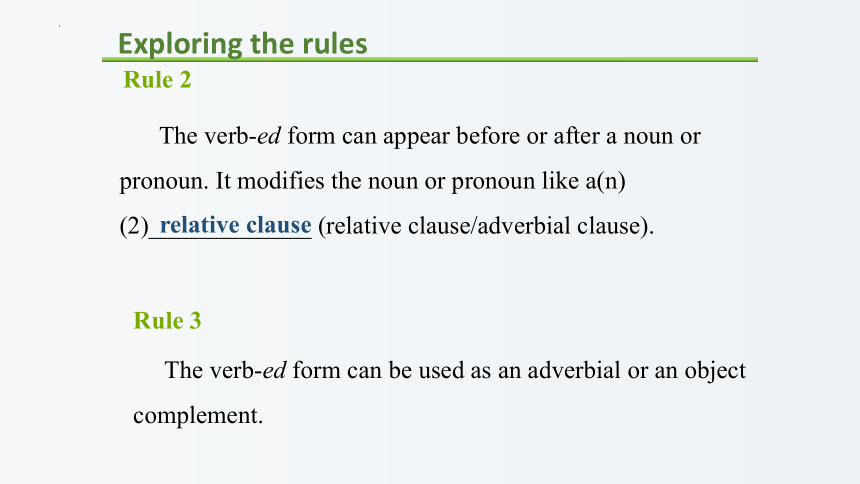
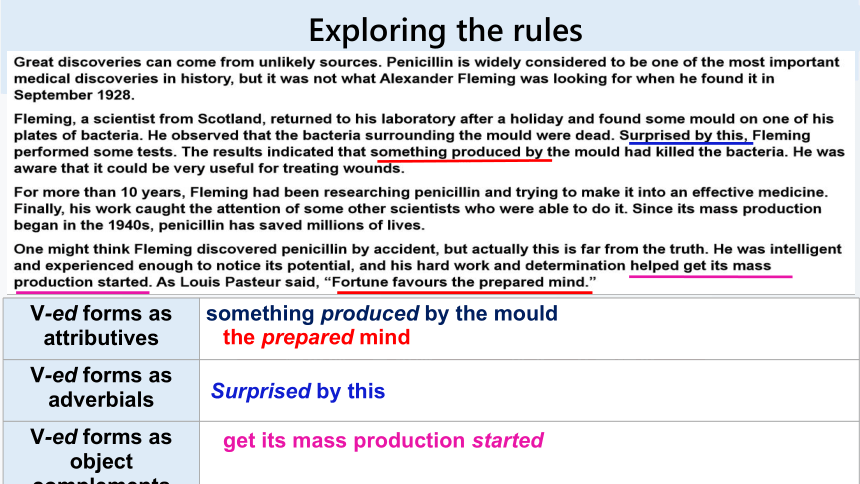

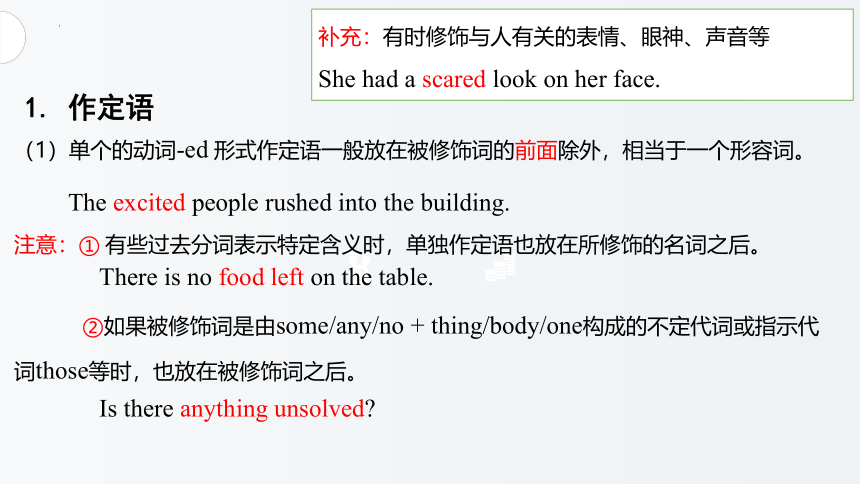
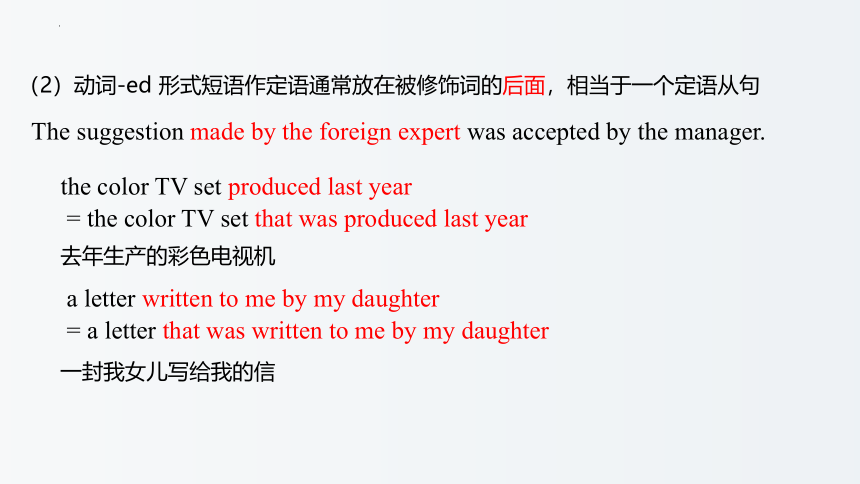
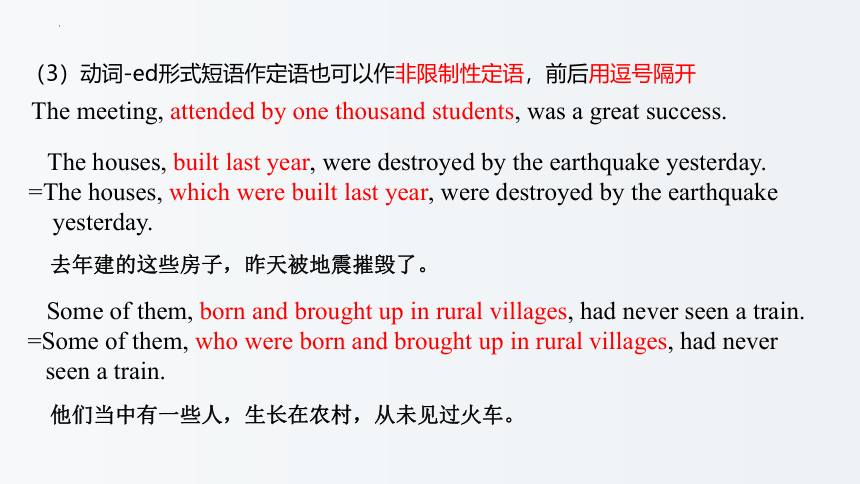
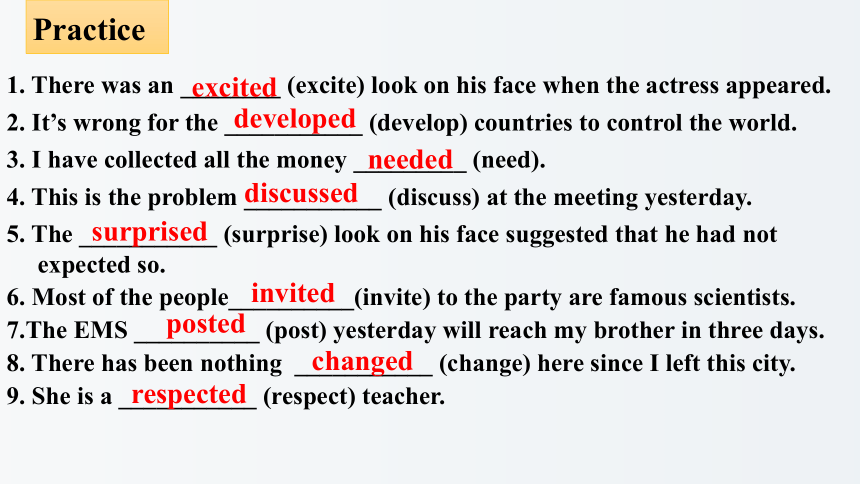
文档简介
(共50张PPT)
新牛津译林版高中英语必修三
Unit4 Scientists who changed the world
Grammar and Usage
Exploring the rules
Why in the above five sentences verb-ed forms
are used rather than verb-ing forms
Exploring the rules
The verb-ed form can be used like an adjective or an
adverb, indicating a(n) (1) _______(active/passive) meaning.
passive
Rule 1
Exploring the rules
Verb-ed forms as attributives something produced by the mould
Verb-ed forms as adverbials
Verb-ed forms as object complements
the prepared mind
surprised by this
get its mass production started
Exploring the rules
Henry is reading a science magazine article about a world-changing
discovery. Find the verb-ed forms in the article and fill in the table
below. The first has been done for you.
The verb-ed form can appear before or after a noun or pronoun. It modifies the noun or pronoun like a(n) (2)_____________ (relative clause/adverbial clause).
relative clause
Rule 2
Rule 3
The verb-ed form can be used as an adverbial or an object
complement.
Exploring the rules
Exploring the rules
偶然地,意外地
远非,几乎相反
V-ed forms as attributives something produced by the mould
V-ed forms as adverbials
V-ed forms as object complements
the prepared mind
get its mass production started
Surprised by this
Working Out the Rules
1. 作定语
(1)单个的动词-ed 形式作定语一般放在被修饰词的前面除外,相当于一个形容词。
The excited people rushed into the building.
注意:① 有些过去分词表示特定含义时,单独作定语也放在所修饰的名词之后。
②如果被修饰词是由some/any/no + thing/body/one构成的不定代词或指示代词those等时,也放在被修饰词之后。
There is no food left on the table.
Is there anything unsolved
补充:有时修饰与人有关的表情、眼神、声音等
She had a scared look on her face.
the color TV set produced last year
= the color TV set that was produced last year
a letter written to me by my daughter
= a letter that was written to me by my daughter
一封我女儿写给我的信
去年生产的彩色电视机
(2)动词-ed 形式短语作定语通常放在被修饰词的后面,相当于一个定语从句
The suggestion made by the foreign expert was accepted by the manager.
The houses, built last year, were destroyed by the earthquake yesterday.
=The houses, which were built last year, were destroyed by the earthquake yesterday.
去年建的这些房子,昨天被地震摧毁了。
Some of them, born and brought up in rural villages, had never seen a train.
=Some of them, who were born and brought up in rural villages, had never seen a train.
他们当中有一些人,生长在农村,从未见过火车。
(3)动词-ed形式短语作定语也可以作非限制性定语,前后用逗号隔开
The meeting, attended by one thousand students, was a great success.
1. There was an ________ (excite) look on his face when the actress appeared.
2. It’s wrong for the ___________ (develop) countries to control the world.
3. I have collected all the money _________ (need).
4. This is the problem ___________ (discuss) at the meeting yesterday.
5. The ___________ (surprise) look on his face suggested that he had not expected so.
6. Most of the people__________(invite) to the party are famous scientists.
7.The EMS __________ (post) yesterday will reach my brother in three days.
8. There has been nothing ___________ (change) here since I left this city.
9. She is a ___________ (respect) teacher.
excited
developed
needed
discussed
surprised
invited
posted
changed
respected
Practice
2. 作状语
动词-ed 形式作状语,可以表示时间、原因、条件、让步、方式或伴随情况,在作用上相当于相应的状语从句,其逻辑主语通常要与句子的主语保持一致。
时间:Born at the beginning of the century, he became president in the early 1940’s.
原因: Depressed, he went to see his elder sister.
条件: Given more time and support, we could have done it better.
让步(相当于though/although引导的让步状语从句):
Tried again, the experiment still couldn’t give us a satisfying answer.
方式或者伴随:The teacher sat there telling stories, surrounded by a lot of students.
动词-ed形式(短语)作状语时,前面可以加一个连
词,使动词-ed形式(短语)所表示的时间、让步、条件
等关系更清楚。这类连词包括although,if,once,though
,when,while,whenever,unless,as if,even though等。
动词-ed形式(短语)作状语时,前面可以加一个连词,使动词-ed形式(短语)所表示的时间、让步、条件等关系更清楚。这类连词包括although,if,once,though,when,while,whenever,unless,as if,even though等。
e.g. When combined with practice, theory becomes easier to learn.
Though warned of the danger, he still went skating on the thin ice.
Unless heated, a body will have no tendency to expand (膨胀).
有些动词-ed 形式因为来源于系表结构,作状语时不表示被动,而表示状态。这样的动词-ed形式及短语常见的有:
lost (迷路),seated (坐),hidden(躲), stationed(驻扎),born(出生),
lost/absorbed in (陷入,专注于), dressed in(穿着),tired of (厌烦)等。
(1) Lost/Absorbed in deep thought, he did not hear the sound.
(1) Born in this beautiful city, he hates to leave it.
① Destroyed by the hurricane, the old house is nowhere to be found.
由于飓风的破坏,那座老房子哪也找不到了。
(As/Because it has been)
② Bitten by the cobra, the man was in danger.
因为被眼镜蛇咬了,这人处在危险中。
(Because he was)
1. 作原因状语
① Seen from the top of the building, our
school looks beautiful.
从楼顶上看,学校看起来很美。
② Water boils, heated to 100℃.
水加热到100度就沸腾。
(When it is)
2. 作时间状语
(When it is)
虽然他很疲倦,他仍然继续工作。
Tired, he went on working.
(Although he was)
3. 作让步状语
Punished by the parents, he won't come again.
他若是被家长惩罚了,就再也不能来了。
(If he is)
4. 作条件状语
② Absorbed in the work, he neglected food and sleep.
他专心于工作,废寝忘食。
① She walked out of the house, followed by her little daughter.
她走出房间,后面跟着她的小女儿。
(and she was)
(He was)
5. 作伴随或方式状语
Rewrite the following sentences, verb-ed forms as adverbials.
1. He was buried in an ocean of loneliness and felt left out.
Buried in an ocean of loneliness, he felt left out.
2. As she was given advice by the famous detective, the girl was no longer afraid.
Given advice by the famous detective, the girl was no longer afraid.
3. Even if he was laughed at by many people, he continued his research.
Laughed at by many people, he continued his research.
______ from the top of the building, the school looks beautiful.
______ from the top of the building, we found the school beautiful.
Seen
Seeing
从楼顶上看,学校看起来很美。
我们从楼顶往下看,发现学校很美。
1. __________ (compare) Shanghai with Xi'an, we found Shanghai is larger.
2. _________ (compare) with Xi'an, Shanghai is larger.
3. ______ (lose) himself in thought, he almost ran into the car in front of him.
4. ____ (lose) in thought, he almost ran into the car in front of him.
Comparing
Compared
Losing
Lost
3. 作宾语补足语
动词-ed 形式作宾语补足语,其逻辑主语是句子的宾语,宾语与宾语补足语之间是被动关系,常见的动词-ed 形式做宾语补足语的动词有两类:
(1)使役动词 make, get, have, keep, leave 等.
I’ll have my hair cut tomorrow.
Don’t leave those things undone.
注意:①动词-ed形式所表示的动作由他人实施。
②动词-ed形式所表示的动作由句中的主语实施。
He had his money stolen when going shopping.
He likes to have his arms crossed when talking with others.
表示感观、感觉和发觉的动词。如:watch, observe, see, hear, listen to, feel, notice, find等。
① When we got to school, we saw the door locked.
② He found his house broken into when he got back home.
当我们到学校时,我们看见门锁着。
回到家他发现家被盗。
在with的复合结构中也可用动词-ed作宾语补足语。这一结构通常在句中作时间、方式、条件、原因等状语。
① The murderer was brought in, with his hands tied behind his back.
② With water heated, we can see the steam.
③ With the matter settled, we all went home.
凶手被带进来了,他的双手被绑在背后。(表方式)
水一被加热,我们就会看到水蒸气。(表条件)
事情得到解决,我们都回家了。(表原因)
1. Watching the __________ (finishing/finished) painting, Alice couldn't help smiling.
2. Most of the artists __________ (inviting/invited) to the party were from South Africa.
3. Do you still remember the Olympic Games________(held/holding)
in Beijing in 2008
4. The __________ (surprising/surprised) look on her face suggested that she hadn't known the news before.
5. There are many ________ (fallen / falling) leaves on the street.
finished
invited
held
surprised
fallen
6. ____________ (frighten) by the noise outside, Sue dared not sleep in her bedroom.
7. ___________ (compare) with our small flat, Bill's house seemed like a palace.
8. ______ ( face) with such a difficult task, we must redouble our efforts.
9. __________ (order) over a week ago, the books are expected to arrive any time now.
10. The lady returned home, _________ (follow) by the famous detective Holmes.
Frightened
Compared
Faced
followed
Ordered
11. My computer broke down this morning, and I will get it _________ (repair) as soon as possible.
12. We saw the house ________ (burn) to the ground when we got there.
13. When he entered the room, he found the window _________ (break).
14. She won't have her long and beautiful hair _____ (cut) short.
15. The speaker raised her voice but still couldn't make herself _______ (hear).
repaired
burned
broken
cut
heard
Applying the rules
B Applying the rules
B1 Rewrite the following sentences using verb-ed forms as attributives,
adverbials or object complements
P49 B1
1. The scientist who has been highly praised won an award.
2. The experiment that is mentioned in your article is
interesting.
3. The patients soon recovered because they were treated
with the new medicine.
4. The scientist found that the equipment in the laboratory
had been destroyed.
5. Once this report is finished, it will be very useful for
future research.
The highly praised scientist won an award.
The experiment mentioned in your article is interesting.
Treated with the new medicine, the patients soon recovered.
The scientist found the equipment in the laboratory destroyed.
Once finished, this report will be very useful for future research.
attributive
attributive
adverbial
object complement
adverbial
Henry is reading an article about Franklin's kite plete the article below with the correct verb-ed forms or verb-ing forms.
We should analyze the relationship between the logic subject and the verb to decide whether it is passive or active.
Sometimes, verb-ed can be used as an adjective meaning “...的”; verb-ing can be used as an adjective meaning “令人...的”.
Benjamin Franklin was a famous scientist, writer, printer, inventor and politician. As a scientist, he was well known for his kite experiment. The story goes like this: Franklin had found lightning _____________ (interest) for years, believing it was actually electricity. He designed an experiment to prove his theory.
He worked out that by flying a kite during a thunderstorm, electricity could go through the wet kite line down to earth.
interesting
________ (know) it was too dangerous to hold the wet line, Franklin held a silk ribbon ________ (tie) to the end of it. He made sure the silk ribbon stayed dry so that the electricity would not go through his body. Then he attached a metal key where the ribbon and kite line joined. When a thunderstorm approached, the lightning would charge the key. ___________ (conduct) on a stormy day in 1752, his experiment proved lightning really was just electricity.
Knowing
tied
Conducted
Franklin had his theory _________ (accept) by many people. However, some people questioned whether he had actually done the experiment, __________ (argue) that if he had really done it, he would have received a deadly electric shock. Whatever the truth, Franklin did make contributions to the studies of electricity.
arguing
accepted
Why was Franklin’s experiment questioned
Because many people believed that if he had really done the experiment, he would have received a deadly electric shock.
Useful expressions in B2 :
The story goes like this ...故事是这样的……
work out 计算出
charge 负责;收费;充电
conduct an experiment 进行实验
a stormy day 暴风雨天
a deadly electric shock致命的电击
Looked at a world map and found the eastern coastline of South America and
the western coastline of Africa could fit together;
Did more research and put forward the theory of continental drift;
Published his ideas in The Origin of Continents and Oceans;
People did not accept his theory partly because:
it challenged many theories at that time;
Wegener could not explain the driving force behind continental drift.
Looking at a world map, Alfred Wegener found ...
Read the notes below about Alfred Wegener and his theory of continental drift. Then write a short paragraph using verb-ed forms, verb-ing forms and to-infinitives. The beginning has been written for you.
B3
Useful expressions in B3:
put forward the theory 提出理论
continental drift 大陆漂移说
challenge the theory挑战理论
partly because部分原因是
the driving force驱动力
Looking at a world map, Alfred Wegener found something amazing: the eastern coastline of South America and the western coastline of Africa seemed to fit together. He did more research to find out what caused this. Having collected enough evidence, he put forward his theory of continental drift. Then he had his ideas published in The Origin of Continents and Oceans. However, people did not believe in his theory. For one thing, it challenged many scientific theories widely accepted at that time. For another, Wegener failed to explain the driving force causing the continents to drift apart.
Sample
1. I like eating frying tomatoes with eggs, and I thought it must to be easy to cook.
实战高考。
fried
2. They represent the earth _______ (come) back to life and best wishes for new beginnings.
coming
【解析】考查非谓语动词。句意:我喜欢吃西红柿炒鸡蛋。动词fry与tomatoes之间是动宾关系,所以此处应用V-ed作定语,故将frying改为fried。
【解析】考查非谓语动词。句意:它们代表着大地的复苏和对新开端的美好祝愿。句中谓语动词为represent,所以这里为非谓语动词。名词earth与come back to之间为主动关系,所以用V-ing作后置定语。故填coming。
3. Technological innovations, ____ good marketing, will promote the sales of these products.
A. combined with
B. combining with
C. having combined with
D. to be combined with
4. They make great gifts and you see them many times __________ (decorate) with red envelopes and messages of good fortune.
decorated
Language Points
1. He observed that the bacteria surrounding the mould were
dead.
surround v. to be all around sth/sb (使)包围, 环绕; 围绕
【用法】
surround ... with … 用……包围……
be surrounded by/ with sth./ sb.被某物/某人所包围
eg Tall trees surround the lake.
The lake is surrounded with/by trees.
【拓展】
surrounding adj. (作定语)周围的; 附近的
surroundings n. (pl.) 环境(同environment)
【语境应用】用surround的适当形式填空。
1) Lucy was sitting on the floor ____________ by toys.
2) We decided to explore the _____________ countryside.
3) When he came back to life, he found
himself _____________ by his children.
4) It’s important to work in friendly ______________.
surrounded
surrounding
surrounded
surroundings
2. The results indicated that something produced by the mould
had killed the bacteria.
indicate v. to show that sth is true or exists 表明
eg Research indicates that eating habits are changing
fast.
【用法】
indicate sth. to sb. 向某人指示……
indicate that ... 指示……;表明……
【拓展】
indication n. 象征; 显示; 标示
There is no indication that... 无迹象表明……
There are some indications that...
有迹象表明……
eg There are clear indications that the economy is
improving.
3. Fortune favours the prepared mind.
幸运眷顾有准备的人。
favour v. to treat sb better than you treat other people, especially in an unfair way 偏袒
to prefer one system, plan, way of doing sth, etc. to
another 支持,赞同
to provide suitable conditions for a particular person,
group, etc. 有利于,有助于
【拓展】
n. 恩惠; 照顾; 好意; 关心; 支持
do sb. a favour 帮某人忙
ask a favour of sb. 请某人帮忙
win sb.’s favour 得到某人的欢心/好感
in favour 得宠
out of favour 失宠
in favour of 赞成; 支持; 有利于
【语境应用】完成句子。
1) Could you _______________ and tell Kelly I can’t make it
你帮个忙告诉凯莉说我来不了好吗?
2) Grammar-based teaching methods ________
__________ in the 60s and 70s.
在六七十年代,以语法为基础的教学法失宠了。
do me a favour
went out
of favour
4. When a thunderstorm approached, the lightning would
charge the key.
charge v. ① to ask an amount of money for goods or a service 收费
② to accuse sb formally of a crime so that there can be a trial in court 控诉
③ to pass electricity through sth so that it is stored there
充电
eg The restaurant charged 20 for dinner.
Several people were arrested but nobody was charged.
Before use, the battery must be charged.
【用法】
charge sb. for 为……向某人收取费用
charge sb. with (doing) sth. = accuse sb. of
控告某人(做)某事
【拓展】
n. 费用; 主管
take charge of 掌管;负责……
in charge of 主管,负责……
in/under the charge of 由……负责
free of charge 免费
【语境应用】完成句子。
1) Your order will be delivered _____________ (免费) within a ten mile limit.
2) They charged me five dollars ______ a cup of coffee.
3) The project is ________________ (在……掌管之下) an experienced engineer.
4) The man arrested by the police ________________ (被指控) stealing.
was charged with
free of charge
for
in the charge of
新牛津译林版高中英语必修三
Unit4 Scientists who changed the world
Grammar and Usage
Exploring the rules
Why in the above five sentences verb-ed forms
are used rather than verb-ing forms
Exploring the rules
The verb-ed form can be used like an adjective or an
adverb, indicating a(n) (1) _______(active/passive) meaning.
passive
Rule 1
Exploring the rules
Verb-ed forms as attributives something produced by the mould
Verb-ed forms as adverbials
Verb-ed forms as object complements
the prepared mind
surprised by this
get its mass production started
Exploring the rules
Henry is reading a science magazine article about a world-changing
discovery. Find the verb-ed forms in the article and fill in the table
below. The first has been done for you.
The verb-ed form can appear before or after a noun or pronoun. It modifies the noun or pronoun like a(n) (2)_____________ (relative clause/adverbial clause).
relative clause
Rule 2
Rule 3
The verb-ed form can be used as an adverbial or an object
complement.
Exploring the rules
Exploring the rules
偶然地,意外地
远非,几乎相反
V-ed forms as attributives something produced by the mould
V-ed forms as adverbials
V-ed forms as object complements
the prepared mind
get its mass production started
Surprised by this
Working Out the Rules
1. 作定语
(1)单个的动词-ed 形式作定语一般放在被修饰词的前面除外,相当于一个形容词。
The excited people rushed into the building.
注意:① 有些过去分词表示特定含义时,单独作定语也放在所修饰的名词之后。
②如果被修饰词是由some/any/no + thing/body/one构成的不定代词或指示代词those等时,也放在被修饰词之后。
There is no food left on the table.
Is there anything unsolved
补充:有时修饰与人有关的表情、眼神、声音等
She had a scared look on her face.
the color TV set produced last year
= the color TV set that was produced last year
a letter written to me by my daughter
= a letter that was written to me by my daughter
一封我女儿写给我的信
去年生产的彩色电视机
(2)动词-ed 形式短语作定语通常放在被修饰词的后面,相当于一个定语从句
The suggestion made by the foreign expert was accepted by the manager.
The houses, built last year, were destroyed by the earthquake yesterday.
=The houses, which were built last year, were destroyed by the earthquake yesterday.
去年建的这些房子,昨天被地震摧毁了。
Some of them, born and brought up in rural villages, had never seen a train.
=Some of them, who were born and brought up in rural villages, had never seen a train.
他们当中有一些人,生长在农村,从未见过火车。
(3)动词-ed形式短语作定语也可以作非限制性定语,前后用逗号隔开
The meeting, attended by one thousand students, was a great success.
1. There was an ________ (excite) look on his face when the actress appeared.
2. It’s wrong for the ___________ (develop) countries to control the world.
3. I have collected all the money _________ (need).
4. This is the problem ___________ (discuss) at the meeting yesterday.
5. The ___________ (surprise) look on his face suggested that he had not expected so.
6. Most of the people__________(invite) to the party are famous scientists.
7.The EMS __________ (post) yesterday will reach my brother in three days.
8. There has been nothing ___________ (change) here since I left this city.
9. She is a ___________ (respect) teacher.
excited
developed
needed
discussed
surprised
invited
posted
changed
respected
Practice
2. 作状语
动词-ed 形式作状语,可以表示时间、原因、条件、让步、方式或伴随情况,在作用上相当于相应的状语从句,其逻辑主语通常要与句子的主语保持一致。
时间:Born at the beginning of the century, he became president in the early 1940’s.
原因: Depressed, he went to see his elder sister.
条件: Given more time and support, we could have done it better.
让步(相当于though/although引导的让步状语从句):
Tried again, the experiment still couldn’t give us a satisfying answer.
方式或者伴随:The teacher sat there telling stories, surrounded by a lot of students.
动词-ed形式(短语)作状语时,前面可以加一个连
词,使动词-ed形式(短语)所表示的时间、让步、条件
等关系更清楚。这类连词包括although,if,once,though
,when,while,whenever,unless,as if,even though等。
动词-ed形式(短语)作状语时,前面可以加一个连词,使动词-ed形式(短语)所表示的时间、让步、条件等关系更清楚。这类连词包括although,if,once,though,when,while,whenever,unless,as if,even though等。
e.g. When combined with practice, theory becomes easier to learn.
Though warned of the danger, he still went skating on the thin ice.
Unless heated, a body will have no tendency to expand (膨胀).
有些动词-ed 形式因为来源于系表结构,作状语时不表示被动,而表示状态。这样的动词-ed形式及短语常见的有:
lost (迷路),seated (坐),hidden(躲), stationed(驻扎),born(出生),
lost/absorbed in (陷入,专注于), dressed in(穿着),tired of (厌烦)等。
(1) Lost/Absorbed in deep thought, he did not hear the sound.
(1) Born in this beautiful city, he hates to leave it.
① Destroyed by the hurricane, the old house is nowhere to be found.
由于飓风的破坏,那座老房子哪也找不到了。
(As/Because it has been)
② Bitten by the cobra, the man was in danger.
因为被眼镜蛇咬了,这人处在危险中。
(Because he was)
1. 作原因状语
① Seen from the top of the building, our
school looks beautiful.
从楼顶上看,学校看起来很美。
② Water boils, heated to 100℃.
水加热到100度就沸腾。
(When it is)
2. 作时间状语
(When it is)
虽然他很疲倦,他仍然继续工作。
Tired, he went on working.
(Although he was)
3. 作让步状语
Punished by the parents, he won't come again.
他若是被家长惩罚了,就再也不能来了。
(If he is)
4. 作条件状语
② Absorbed in the work, he neglected food and sleep.
他专心于工作,废寝忘食。
① She walked out of the house, followed by her little daughter.
她走出房间,后面跟着她的小女儿。
(and she was)
(He was)
5. 作伴随或方式状语
Rewrite the following sentences, verb-ed forms as adverbials.
1. He was buried in an ocean of loneliness and felt left out.
Buried in an ocean of loneliness, he felt left out.
2. As she was given advice by the famous detective, the girl was no longer afraid.
Given advice by the famous detective, the girl was no longer afraid.
3. Even if he was laughed at by many people, he continued his research.
Laughed at by many people, he continued his research.
______ from the top of the building, the school looks beautiful.
______ from the top of the building, we found the school beautiful.
Seen
Seeing
从楼顶上看,学校看起来很美。
我们从楼顶往下看,发现学校很美。
1. __________ (compare) Shanghai with Xi'an, we found Shanghai is larger.
2. _________ (compare) with Xi'an, Shanghai is larger.
3. ______ (lose) himself in thought, he almost ran into the car in front of him.
4. ____ (lose) in thought, he almost ran into the car in front of him.
Comparing
Compared
Losing
Lost
3. 作宾语补足语
动词-ed 形式作宾语补足语,其逻辑主语是句子的宾语,宾语与宾语补足语之间是被动关系,常见的动词-ed 形式做宾语补足语的动词有两类:
(1)使役动词 make, get, have, keep, leave 等.
I’ll have my hair cut tomorrow.
Don’t leave those things undone.
注意:①动词-ed形式所表示的动作由他人实施。
②动词-ed形式所表示的动作由句中的主语实施。
He had his money stolen when going shopping.
He likes to have his arms crossed when talking with others.
表示感观、感觉和发觉的动词。如:watch, observe, see, hear, listen to, feel, notice, find等。
① When we got to school, we saw the door locked.
② He found his house broken into when he got back home.
当我们到学校时,我们看见门锁着。
回到家他发现家被盗。
在with的复合结构中也可用动词-ed作宾语补足语。这一结构通常在句中作时间、方式、条件、原因等状语。
① The murderer was brought in, with his hands tied behind his back.
② With water heated, we can see the steam.
③ With the matter settled, we all went home.
凶手被带进来了,他的双手被绑在背后。(表方式)
水一被加热,我们就会看到水蒸气。(表条件)
事情得到解决,我们都回家了。(表原因)
1. Watching the __________ (finishing/finished) painting, Alice couldn't help smiling.
2. Most of the artists __________ (inviting/invited) to the party were from South Africa.
3. Do you still remember the Olympic Games________(held/holding)
in Beijing in 2008
4. The __________ (surprising/surprised) look on her face suggested that she hadn't known the news before.
5. There are many ________ (fallen / falling) leaves on the street.
finished
invited
held
surprised
fallen
6. ____________ (frighten) by the noise outside, Sue dared not sleep in her bedroom.
7. ___________ (compare) with our small flat, Bill's house seemed like a palace.
8. ______ ( face) with such a difficult task, we must redouble our efforts.
9. __________ (order) over a week ago, the books are expected to arrive any time now.
10. The lady returned home, _________ (follow) by the famous detective Holmes.
Frightened
Compared
Faced
followed
Ordered
11. My computer broke down this morning, and I will get it _________ (repair) as soon as possible.
12. We saw the house ________ (burn) to the ground when we got there.
13. When he entered the room, he found the window _________ (break).
14. She won't have her long and beautiful hair _____ (cut) short.
15. The speaker raised her voice but still couldn't make herself _______ (hear).
repaired
burned
broken
cut
heard
Applying the rules
B Applying the rules
B1 Rewrite the following sentences using verb-ed forms as attributives,
adverbials or object complements
P49 B1
1. The scientist who has been highly praised won an award.
2. The experiment that is mentioned in your article is
interesting.
3. The patients soon recovered because they were treated
with the new medicine.
4. The scientist found that the equipment in the laboratory
had been destroyed.
5. Once this report is finished, it will be very useful for
future research.
The highly praised scientist won an award.
The experiment mentioned in your article is interesting.
Treated with the new medicine, the patients soon recovered.
The scientist found the equipment in the laboratory destroyed.
Once finished, this report will be very useful for future research.
attributive
attributive
adverbial
object complement
adverbial
Henry is reading an article about Franklin's kite plete the article below with the correct verb-ed forms or verb-ing forms.
We should analyze the relationship between the logic subject and the verb to decide whether it is passive or active.
Sometimes, verb-ed can be used as an adjective meaning “...的”; verb-ing can be used as an adjective meaning “令人...的”.
Benjamin Franklin was a famous scientist, writer, printer, inventor and politician. As a scientist, he was well known for his kite experiment. The story goes like this: Franklin had found lightning _____________ (interest) for years, believing it was actually electricity. He designed an experiment to prove his theory.
He worked out that by flying a kite during a thunderstorm, electricity could go through the wet kite line down to earth.
interesting
________ (know) it was too dangerous to hold the wet line, Franklin held a silk ribbon ________ (tie) to the end of it. He made sure the silk ribbon stayed dry so that the electricity would not go through his body. Then he attached a metal key where the ribbon and kite line joined. When a thunderstorm approached, the lightning would charge the key. ___________ (conduct) on a stormy day in 1752, his experiment proved lightning really was just electricity.
Knowing
tied
Conducted
Franklin had his theory _________ (accept) by many people. However, some people questioned whether he had actually done the experiment, __________ (argue) that if he had really done it, he would have received a deadly electric shock. Whatever the truth, Franklin did make contributions to the studies of electricity.
arguing
accepted
Why was Franklin’s experiment questioned
Because many people believed that if he had really done the experiment, he would have received a deadly electric shock.
Useful expressions in B2 :
The story goes like this ...故事是这样的……
work out 计算出
charge 负责;收费;充电
conduct an experiment 进行实验
a stormy day 暴风雨天
a deadly electric shock致命的电击
Looked at a world map and found the eastern coastline of South America and
the western coastline of Africa could fit together;
Did more research and put forward the theory of continental drift;
Published his ideas in The Origin of Continents and Oceans;
People did not accept his theory partly because:
it challenged many theories at that time;
Wegener could not explain the driving force behind continental drift.
Looking at a world map, Alfred Wegener found ...
Read the notes below about Alfred Wegener and his theory of continental drift. Then write a short paragraph using verb-ed forms, verb-ing forms and to-infinitives. The beginning has been written for you.
B3
Useful expressions in B3:
put forward the theory 提出理论
continental drift 大陆漂移说
challenge the theory挑战理论
partly because部分原因是
the driving force驱动力
Looking at a world map, Alfred Wegener found something amazing: the eastern coastline of South America and the western coastline of Africa seemed to fit together. He did more research to find out what caused this. Having collected enough evidence, he put forward his theory of continental drift. Then he had his ideas published in The Origin of Continents and Oceans. However, people did not believe in his theory. For one thing, it challenged many scientific theories widely accepted at that time. For another, Wegener failed to explain the driving force causing the continents to drift apart.
Sample
1. I like eating frying tomatoes with eggs, and I thought it must to be easy to cook.
实战高考。
fried
2. They represent the earth _______ (come) back to life and best wishes for new beginnings.
coming
【解析】考查非谓语动词。句意:我喜欢吃西红柿炒鸡蛋。动词fry与tomatoes之间是动宾关系,所以此处应用V-ed作定语,故将frying改为fried。
【解析】考查非谓语动词。句意:它们代表着大地的复苏和对新开端的美好祝愿。句中谓语动词为represent,所以这里为非谓语动词。名词earth与come back to之间为主动关系,所以用V-ing作后置定语。故填coming。
3. Technological innovations, ____ good marketing, will promote the sales of these products.
A. combined with
B. combining with
C. having combined with
D. to be combined with
4. They make great gifts and you see them many times __________ (decorate) with red envelopes and messages of good fortune.
decorated
Language Points
1. He observed that the bacteria surrounding the mould were
dead.
surround v. to be all around sth/sb (使)包围, 环绕; 围绕
【用法】
surround ... with … 用……包围……
be surrounded by/ with sth./ sb.被某物/某人所包围
eg Tall trees surround the lake.
The lake is surrounded with/by trees.
【拓展】
surrounding adj. (作定语)周围的; 附近的
surroundings n. (pl.) 环境(同environment)
【语境应用】用surround的适当形式填空。
1) Lucy was sitting on the floor ____________ by toys.
2) We decided to explore the _____________ countryside.
3) When he came back to life, he found
himself _____________ by his children.
4) It’s important to work in friendly ______________.
surrounded
surrounding
surrounded
surroundings
2. The results indicated that something produced by the mould
had killed the bacteria.
indicate v. to show that sth is true or exists 表明
eg Research indicates that eating habits are changing
fast.
【用法】
indicate sth. to sb. 向某人指示……
indicate that ... 指示……;表明……
【拓展】
indication n. 象征; 显示; 标示
There is no indication that... 无迹象表明……
There are some indications that...
有迹象表明……
eg There are clear indications that the economy is
improving.
3. Fortune favours the prepared mind.
幸运眷顾有准备的人。
favour v. to treat sb better than you treat other people, especially in an unfair way 偏袒
to prefer one system, plan, way of doing sth, etc. to
another 支持,赞同
to provide suitable conditions for a particular person,
group, etc. 有利于,有助于
【拓展】
n. 恩惠; 照顾; 好意; 关心; 支持
do sb. a favour 帮某人忙
ask a favour of sb. 请某人帮忙
win sb.’s favour 得到某人的欢心/好感
in favour 得宠
out of favour 失宠
in favour of 赞成; 支持; 有利于
【语境应用】完成句子。
1) Could you _______________ and tell Kelly I can’t make it
你帮个忙告诉凯莉说我来不了好吗?
2) Grammar-based teaching methods ________
__________ in the 60s and 70s.
在六七十年代,以语法为基础的教学法失宠了。
do me a favour
went out
of favour
4. When a thunderstorm approached, the lightning would
charge the key.
charge v. ① to ask an amount of money for goods or a service 收费
② to accuse sb formally of a crime so that there can be a trial in court 控诉
③ to pass electricity through sth so that it is stored there
充电
eg The restaurant charged 20 for dinner.
Several people were arrested but nobody was charged.
Before use, the battery must be charged.
【用法】
charge sb. for 为……向某人收取费用
charge sb. with (doing) sth. = accuse sb. of
控告某人(做)某事
【拓展】
n. 费用; 主管
take charge of 掌管;负责……
in charge of 主管,负责……
in/under the charge of 由……负责
free of charge 免费
【语境应用】完成句子。
1) Your order will be delivered _____________ (免费) within a ten mile limit.
2) They charged me five dollars ______ a cup of coffee.
3) The project is ________________ (在……掌管之下) an experienced engineer.
4) The man arrested by the police ________________ (被指控) stealing.
was charged with
free of charge
for
in the charge of
同课章节目录
- Unit 1 Nature in the balance
- Welcome to the unit
- Reading
- Grammar and usage
- Integrated skills
- Extended reading
- Project
- Unit 2 Natural disasters
- Welcome to the unit
- Reading
- Grammar and usage
- Integrated skills
- Extended reading
- Project
- Unit 3 The world online
- Welcome to the unit
- Reading
- Grammar and usage
- Integrated skills
- Extended reading
- Project
- Unit 4 Scientists who changed the world
- Welcome to the unit
- Reading
- Grammar and usage
- Integrated skills
- Extended reading
- Project
